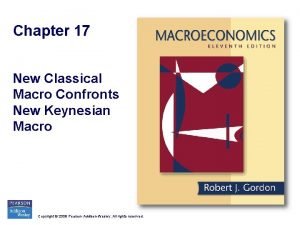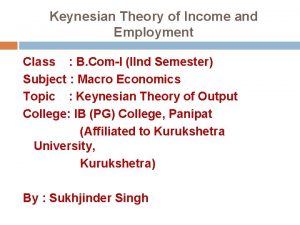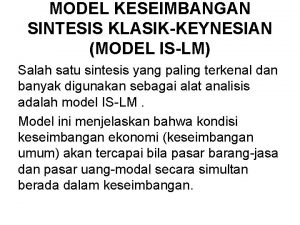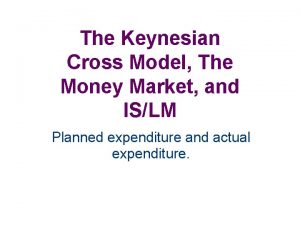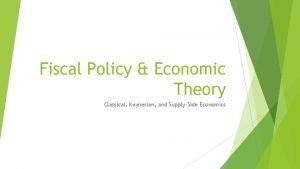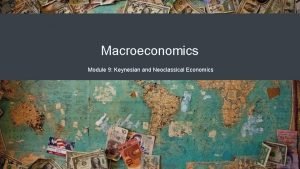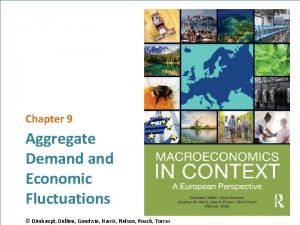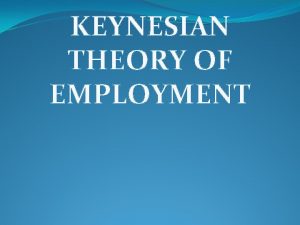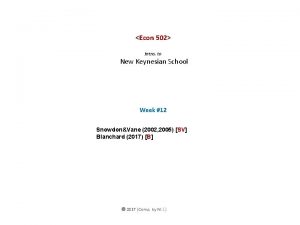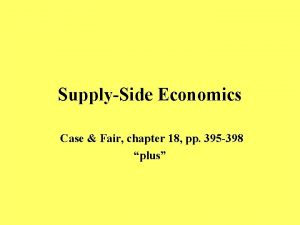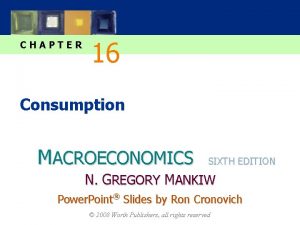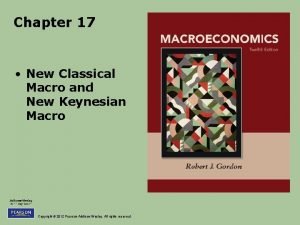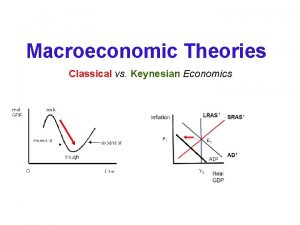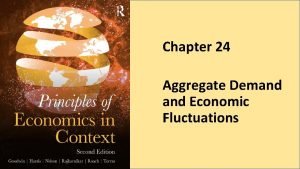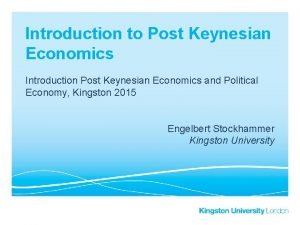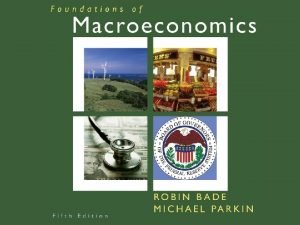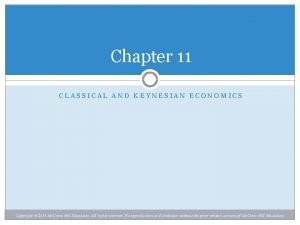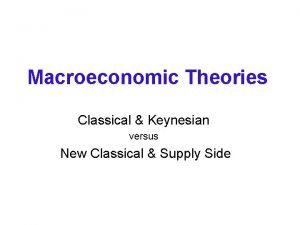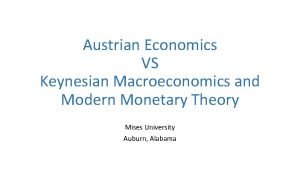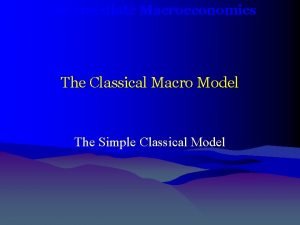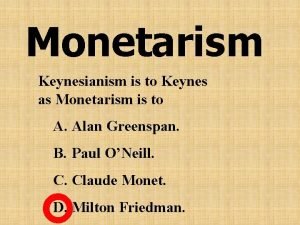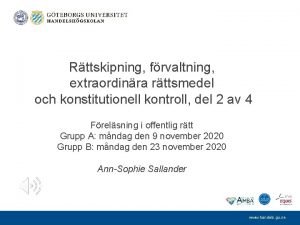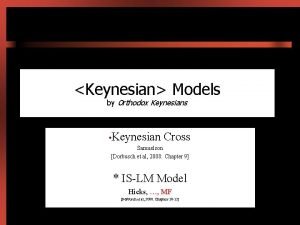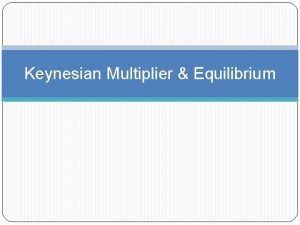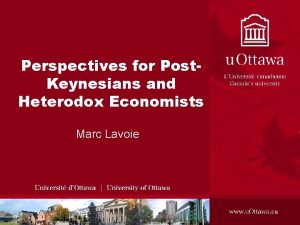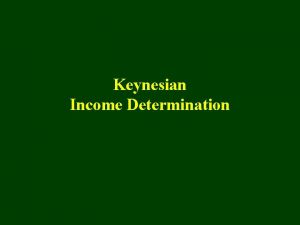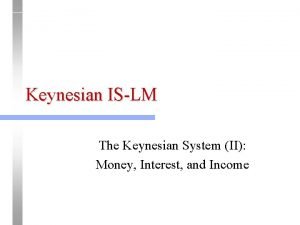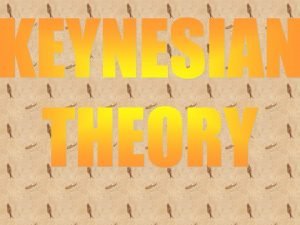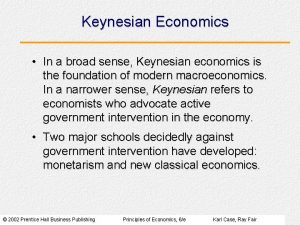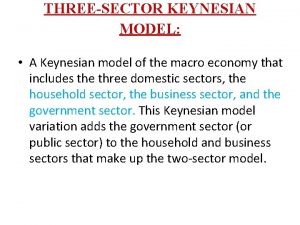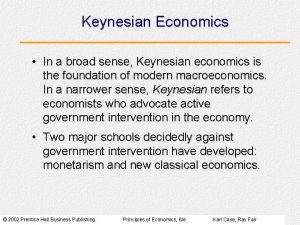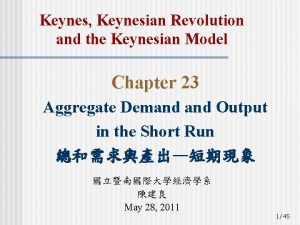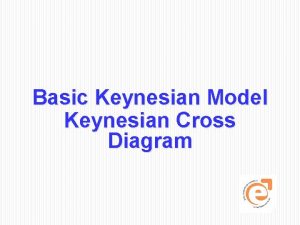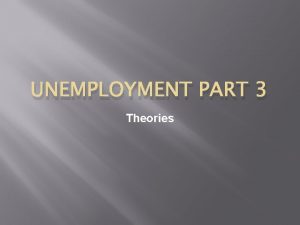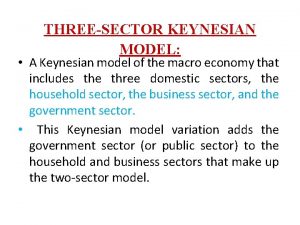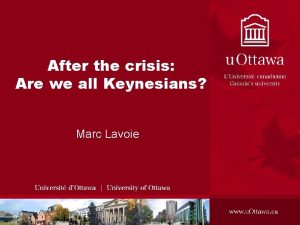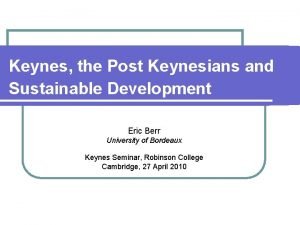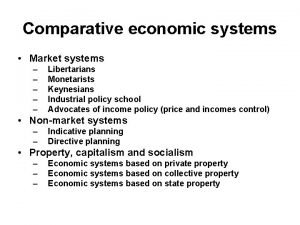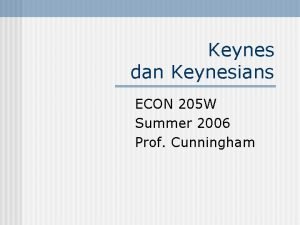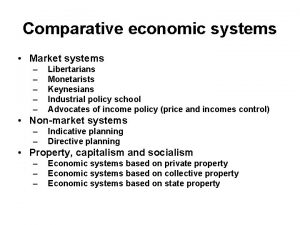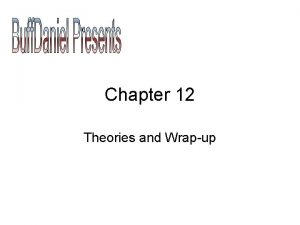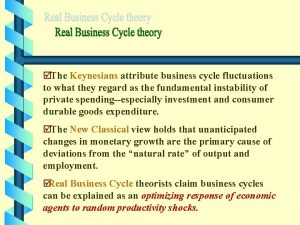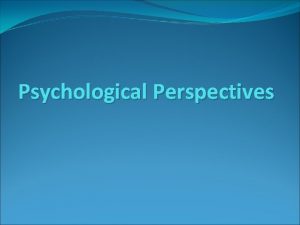Are we all Keynesians The perspectives for Keynesian




























- Slides: 28

Are we all Keynesians? The perspectives for Keynesian theory Marc Lavoie

OUTLINE • SOME BACKGROUND: THE IMPACT OF THE FINANCIAL CRISIS ON MACROECONOMIC THEORY AND KEYNESIAN THEORY • PERSPECTIVES AND ADVICE FOR POST-KEYNESIAN THEORY Brazilian Keynesian Association, Porto Alegre, September 2009

But first what is Keynesian economics? • New Keynesians – Nominal rigidities – Real rigidities – Coordination problems, multiple equilibria • New Consensus Keynesians (New neoclassical synthesis: endogenous money, real business cycles, rigidities) • Post-Keynesians – Fundamentalist Keynesians – Kaleckians/Kaldorians – Neo-Ricardian Keynesians Brazilian Keynesian Association, Porto Alegre, September 2009

What defines Keynesians? Is it a belief …. • • • In the existence of involuntary unemployment In the principle of effective demand the paradox of thrift In the existence of an independent investment function • • That capitalism is the best system but that it needs to be tamed That markets, especially financial markets, are inherently unstable The need for fiscal counter-cyclical policies The need for capital movement impediments, managed exchange rates • • In animal spirits and fundamental uncertainty In path dependence, multiple equilibria, and hysteresis In the non-neutrality of money, the significance of liquidity The dangers of wage and price deflation • In the existence of imperfections that thwart price adjustments Brazilian Keynesian Association, Porto Alegre, September 2009

The question put to us seems to imply that Keynesianism is making a comeback. Was Keynesianism ever set aside? • The answer is yes and no. • Clearly, in academia, Keynesianism was a dirty word in the late 1970 s and early 1980 s, and it is only in the late 1980 s and early 1990 s that the New Keynesians made it respectable again. • However, at the policy level, at least in the rich industrialized countries, “the macroeconomic research of the past three decades had only minor impact on the practical analysis of monetary or fiscal policy” (Mankiw 2006). • Policy makers and international organizations still opt either for the simple Keynesian counter-cyclical policies or for simple pre. Keynesian policies (cf. J. Galbraith 1994 -5). • Central bankers have reverted to interest-rate targeting, as argued in the days of the Radcliffe committee 50 years ago, which was influenced by Cambridge Keynesians. Brazilian Keynesian Association, Porto Alegre, September 2009

The financial crisis has brought about a second Keynesian pragmatic revolution • In contrast to previous financial crises, the IMF has advocated low interest rates and government stimulus packages with budget deficits for industrialized countries; • G 20 leaders move away from unfettered markets and uncontrolled capitalism; financial regulation is back. • According to Gordon Brown (UK), author of the ‘golden rule’: “The Washington consensus is out”; • Financial Times: “The credit crunch has destroyed faith in the free market ideology”. Brazilian Keynesian Association, Porto Alegre, September 2009

Is there also a second Keynesian academic revolution? A rather negative answer: “These changes in ideology among world politicians create a different environment for economists. But as yet there are no strong shifts of opinion or practice among academic leaders of our profession. We search in vain for similar conversions or recantations. The signs are business as usual” (Hodgson, CJE 2009) Brazilian Keynesian Association, Porto Alegre, September 2009

But there are indeed some academic leaders that reject current mainstream macro theory • Richard Posner, University of Chicago Law school, 2009: – « Keynes wanted to be realistic about decision-making rather than explore how far an economist could get by assuming that people really do base decisions on some appromimation of cost-benefit analysis » . • Akerlof and Shiller, 2009, p. 168: – « It is necessary to incorporate animal spirits into macroeconomic theory in order to know how the economy really works. In this respect the macroeconomics of the past thirty years has gone in the wrong direction. In their attempt to clean up macroeconomics and make it more scientific, the standard macroeconomists have imposed a research structure and discipline by focusing on how the economy would behave if people had only economic motives and they were also fully rational » . Brazilian Keynesian Association, Porto Alegre, September 2009

And others have even a harsher diagnostic • Willem H. Buiter 2009, LSE professor, former member of the Monetary Policy Committee of the Bank of England: • « The typical graduate macroeconomics and monetary economics training received at Anglo-American universities during the past 30 years or so [Lucas, Prescott, Sargent, Barro, Woodford], may have set back by decades serious investigations of aggregate economic behaviour and economic policy-relevant understanding. » • « Most of the profession continued to swallow the EMH [efficient market hypothesis] hook, line and sinker, although there were influential advocates of reason throughout, including James Tobin, Robert Shiller, George Akerlof, Hyman Minsky, Joseph Stiglitz and behaviourist approaches to finance. » Brazilian Keynesian Association, Porto Alegre, September 2009

This is unlikely to change mainstream scholarly activity in macroeconomics however • While there is a certain amount of tolerance in microeconomics, with experimental economics and behavioural economics at the vanguard, game theory and multi-agent modelling, things are very much different in macroeconomics. • Colander gives many examples of tolerance in microeconomics, but few or none in macroeconomics. • Indeed, the accepted framework for macroeconomics has become more orthodox and stringent (Dutt 2003, King 2008). There has to be a forward-looking optimizing representative agent. • Experience as a recent writer for the Canadian version of the Baumol and Blinder principles of economics textbook has shown that it is much easier to introduce heterodox themes and critiques in microeconomics than it is to do so in macroeconomics. Brazilian Keynesian Association, Porto Alegre, September 2009

There is a very strong counter-revolution against the revival of Keynesian economics • It is claimed by defenders of the market faith that government intervention and bad regulation are the causes of the crisis. Free -market capitalism is essentially perfect and stable. – The US government would have forced banks to grant subprime loans. – The Fed set short-term rates at too low a level (from 2002 to 2004). – The Chinese rigged the exchange rate and flooded long-term bond markets, also leading to overly low long-term rates. • There would be no crises if government was small and interest rates were always set at their natural levels. • Stimulus packages have no impact on aggregate output. • Expansionary fiscal policy and low interest rates will prolong the crisis, as it did in the 1930 s. Brazilian Keynesian Association, Porto Alegre, September 2009

What will be the final impact of the crisis on academia? Two possibilities • Mainstream macroeconomics will become ever more entrenched in its models and assumptions : the New consensus model, which is a variant of the real business cycle model with some rigidities, will be slightly amended and all other approaches will still be dismissed. • Or, but this is less likely, there will be more tolerance with respect to other theories, even if it does not incorporate the intertemporal utility maximizing representative agent with rational expectations, but only as long as theories are formalized in some way. Brazilian Keynesian Association, Porto Alegre, September 2009

What will be the impact of the financial crisis on economics at large? • In the short-run, many more students should take economics, trying to understand what has happened. • It is unlikely that economics students will be provided with any convincing answer. As a result, in the medium run, there should be even less students than before in (orthodox) economics department as students will be disillusioned. • Government employers are themselves disillusioned with economics, as the financial crisis has demonstrated the futility of economic advice and theories. • Economics departments may become like departments of philosophy, theology, or ancient greek. • They might be supplanted by fields such as public policy, public affairs, international affairs, public administration, or others (C. Goodwin 2000). Brazilian Keynesian Association, Porto Alegre, September 2009

PERSPECTIVES FOR POST-KEYNESIAN THEORY • Prolegomena: – Evolution of the major themes of post-Keynesian theory – Defining heterodoxy, orthodoxy, dissenters • The future of post-Keynesian economics – Negative advice by methodologists and others – Positive advice by others and myself Brazilian Keynesian Association, Porto Alegre, September 2009

The evolution of post-Keynesian theory • • • 1930 s: Unemployment 1950 s: Neo-Keynesian models of growth and distribution 1960 s: Capital controversies 1970 s: Theory of the firm and pricing, definition of the school 1980 s: Kaleckian models of growth, endogenous money, financial fragility hypothesis • Late 1980 s early 1990 s: Attempts at synthesis and textbooks (the Romantic Age, Fontana and Gerrard 2006) • 1990 s: Methodology (critical realism), history of economic thought (the Age of Uncertainty F&G) • 2000 s: Economic policy, empirical work, new attempts at synthesis ? Brazilian Keynesian Association, Porto Alegre, September 2009

Initial distinctions: Orthodox vs Heterodox economics • Let us use a distinction proposed by Backhouse (2004). • Dissent is a rejection of the mainstream (the accepted textbook view). • But dissenters may arise from within the orthodoxy: they are orthodox dissenters; • Or dissenters may come from outside the orthodoxy: they are heterodox dissenters. They are heretics. • Colander argues that the best orthodox authors are dissenters: they are part of ‘the cutting edge’. Brazilian Keynesian Association, Porto Alegre, September 2009

Dissenters and “the edge” Heterodoxy Dissenters Orthodoxy Mainstream Colander’s Edge Brazilian Keynesian Association, Porto Alegre, September 2009

Examples of orthodox dissenters • J. M. Keynes 1936 ? • Milton Friedman in the 1950 s (became mainstream in the late 1960 s) • The New Consensus view (has become mainstream in central banks) • Bénassy/Malinvaud (disequilibrium Keynesianism) in the 1970 s • D. Rodrik, Shiller, H. A. Simon, R. Coase, Leontief, Vickrey, Akerlof, Stiglitz, Sen, Krugman (getting a Nobel Prize helps to be a dissenter that is heard; some became heterodox!) • New Institutionalism • Post-Walrasian economics (à la Colander), complex or chaos economics, multi-agent modeling (note however that the Economics section of the Santa Fe Institute has now been closed down). Brazilian Keynesian Association, Porto Alegre, September 2009

Orthodox vs heterodox dissenters • The financial crisis may give more room for orthodox dissenters in macroeconomics • But it is unlikely to improve the fate of heterodox dissenters, including post-Keynesians, within departments of economics • However the standing of heterodox dissenters may improve in departments other than economics (social sciences, public administration, etc. ) Brazilian Keynesian Association, Porto Alegre, September 2009

What is the future of post-Keynesian economics (or heterodox economics)? • Over the last few years, there has been a flurry of articles claiming that neoclassical economics has changed, or discussing the future of post-Keynesian economics or of heterodox dissenters: • Colander 2000 2003 2008, Colander + Holt + Rosser 2004 2007 -8, Davis 2006 2008, Garrett 2006, Fontana + Gerrard 2006, Dequech 2007 -8, Davidson 2005, with responses by Dutt 2003, King 2008, Stockhammer+Ramskogler 2008, Lee 2009, Vernengo 2009 • I found some of these papers irritating. On many occasions I felt I should also get into the conversation, but thought I might be losing my time: It is better to do things than to focus on what should be done! Brazilian Keynesian Association, Porto Alegre, September 2009

(Negative) Advice being given to PK or heterodox economists • Colander 2008, Colander et al. 2007 -8 – Worry less about methodology • Garnett 2006 – Abandon “oppositional anti-mainstream stances” • Colander et al. 2007 -8, Fontana and Gerrard 2006 – Move away from criticizing the neoclassical strawman found in textbooks • Rutherford 2000 – Stop defending the ‘true faith’ as found in the works of founders Brazilian Keynesian Association, Porto Alegre, September 2009

(Positive) Advice being given to PK economists (in relation to the mainstream) • Colander 2008 – If you don’t master techniques, get into pedagogy or policy advice. • Fontana 2005 – Follow more closely the latest developments in mainstream theory • Fontana and Gerrard 2006 – “Engage in a more constructive dialogue with mainstream economics with the objective of encompassing relevant neoclassical models within a more general framework that incorporates PK alternatives”. • Colander Holt Rosser 2004, 2007 -8, 2008 – Engage with the elite and cutting-edge portions of neoclassical theory, by providing papers with new ideas and an understanding of recent orthodox theory. Brazilian Keynesian Association, Porto Alegre, September 2009

(Technical) Advice being given to PK economists (in relation to the mainstream) • Fontana and Gerrard 2006 – “Produce theoretical models that provide testable hypotheses sustained by empirical evidence”. • Colander Holt Rosser 2008 – “To make the transfer from the heterodox incubator to the mainstream, the ideas must be developed in a formal model and buttressed by technical empirical work. . “ with a modeling methodology acceptable to the mainstream” – Heterodox economists should do joint work with mathematicians and statisticians to be able to enter the debate with the mainstream. Brazilian Keynesian Association, Porto Alegre, September 2009

Counter-advice ! • Lee 2009 – Stop trying to reform mainstream economics – “Heterodox economics is not defined in oppositional terms or as a dual to mainstream economics but as an alternative to it” – If neoclassical theory were to disappear, heterodox economics would be unaffected • Stockhammer Ramskogler 2008 – Don’t try “to reformulate PK models such that they are easy to understand for mainstream economists (if they care to listen)” – “The focus on the relation to mainstream economics is misplaced…. The debate on how PKE relates to the mainstream is in fact, not an important issue for the future of PKE”. Brazilian Keynesian Association, Porto Alegre, September 2009

It takes two to tango (King 2002)! • Colander et al. would like PK economists to engage more with the mainstream. • However, as pointed out by Vernengo (2009), “the acceptable critiques of orthodoxy must come from mainstream insiders”. • A good example of this is theory of endogenous money, endorsed by well-known post-Keynesian authors such as Kaldor since 1970. Despite this, PK authors are never mentioned in the New Consensus literature when it comes to acknowledge that the supply of money is demand-determined in their models. • The same is likely to occur when Minskyan-like financial fragility will be embedded in neoclassical models of the future. Brazilian Keynesian Association, Porto Alegre, September 2009

On pluralism • Rutherford 2000 – “Encourage diversity and pluralism” • Lawson 2009 ROPE – “Draw on the best of heterodox traditions to try to develop them” • Stockhammer Ramskogler 2008 – “Cooperate institutionally with other heterodox approaches and non-orthodox streams in the fight for a pluralistic economics” – “There should be obvious potential gains from cooperation between PKs and other heterodox positions”. • Lavoie 2005 – “Encourage young researchers to be eclectic heterodox authors” Brazilian Keynesian Association, Porto Alegre, September 2009

Advice that I am in strong agreement with • Stockhammer Ramskogler 2008 – “Be politically relevant… Develop an analysis for new social and economic problems… Be relevant in explaining realworld problems” – Expand the research agenda of PKE, close crucial gaps in its analysis (environment, supply side, information and communication technology, delocalization, etc. ) • Vernengo 2009 – Aim at “policy makers that are often more pragmatic and clearly more relevant” – We must continue to pursue our own PK agenda ( trying to track the fads of the orthodox edge induces us to ignore relevant problems that may erupt in the future: unemployment, financial instability, etc. ) Brazilian Keynesian Association, Porto Alegre, September 2009

My own advice • Stop wasting time on criticizing PK strawmen (e. g. , forget about the horizontalists vs structuralists debate!) • Study carefully the existing institutions, as they are likely to provide evidence that supports heterodox or PK theoretical positions (e. g. , central bank and payment systems). • Econometrics is a tool of the rhetoric of economics, and as such should be used by PKE, whatever their philosophical doubts about its validity. • If you are interested in the SFC approach (with its budget constraints, sectoral accounting constraints and stock-flow constraints), there is a need to construct a relatively simple model, that could be used by central bankers or fiscal decisionmakers, that would incorporate these constraints and the main real-financial interactions of PK theory. Brazilian Keynesian Association, Porto Alegre, September 2009
 Antigentest åre
Antigentest åre New classical macroeconomics
New classical macroeconomics Explain the keynesian theory of employment
Explain the keynesian theory of employment Model keseimbangan keynesian
Model keseimbangan keynesian Keynesian cross model
Keynesian cross model Keynesian economics policy
Keynesian economics policy Neoclassical economics examples
Neoclassical economics examples Keynesian model
Keynesian model Explain the keynesian theory of employment
Explain the keynesian theory of employment New classical and new keynesian macroeconomics
New classical and new keynesian macroeconomics Supply vs demand side economics
Supply vs demand side economics Keynesian consumption function
Keynesian consumption function Keynesian vs classical vs monetarist
Keynesian vs classical vs monetarist Classical economics vs keynesian
Classical economics vs keynesian Keynesian model
Keynesian model Keynesian policy
Keynesian policy Classical keynesian and monetarist
Classical keynesian and monetarist Keynes law
Keynes law Keynesian vs classical vs monetarist
Keynesian vs classical vs monetarist Keynesian cross diagram
Keynesian cross diagram Austrian economics vs keynesian
Austrian economics vs keynesian Keynesian consumption function
Keynesian consumption function Monetarism vs keynesianism
Monetarism vs keynesianism Name all rays
Name all rays Ministerstyre för och nackdelar
Ministerstyre för och nackdelar Tillitsbaserad ledning
Tillitsbaserad ledning Bästa kameran för astrofoto
Bästa kameran för astrofoto Sjungen poesi
Sjungen poesi Nyckelkompetenser för livslångt lärande
Nyckelkompetenser för livslångt lärande

